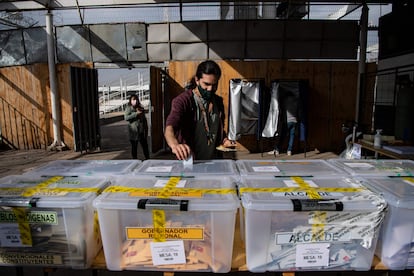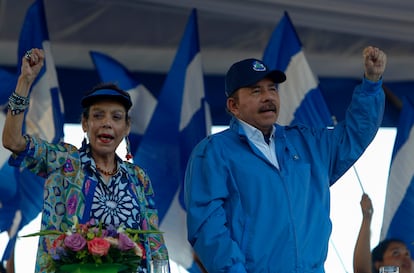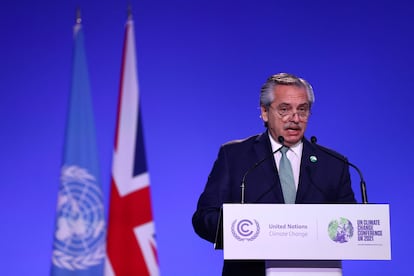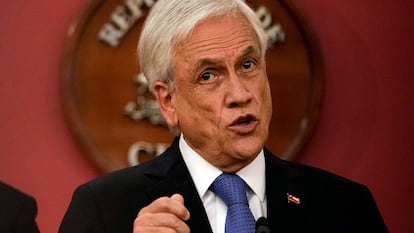Latin America prepares for frantic month of elections in November
Chile, Nicaragua and Honduras will elect presidents, Argentina goes to the ballots in a crucial legislative poll and Venezuela will hold a regional vote with the presence of opposition candidates

Latin America has a full electoral calendar in November. Ballot boxes will change the political landscape in Argentina, Chile and Honduras, while leading to heightened tension in Nicaragua where a general election will be held in which President Daniel Ortega is set to win the vote after jailing all opposition candidates one after the other. Venezuela, meanwhile, will stage regional elections with opposition candidates following the decision of the anti-Chavist political wing to end an electoral boycott and form a united front.
Nicaragua goes to the polls on November 7, with the incumbent the only candidate, given that the other politicians taking part in the process are considered to be puppets of the regime by the opposition. Ortega, who is seeking his third consecutive re-election, unleashed a political crackdown in June when he started to jail those opposition candidates who, according to the polls, had the best chance of winning. Among them was Cristiana Chamorro, daughter of former president Violeta Barrios de Chamorro, who was hoping to repeat her mother’s 1990 defeat of Ortega at the polling booth.
A survey conducted by polling firm Cid Gallup and published in Nicaraguan daily Confidencial last Sunday found that 76% of Nicaraguans believe that Ortega’s reelection to be illegitimate. The poll showed that in a fair election, 65% of voters would cast their ballot for any of “the candidates of the opposition,” while just 17% would back Ortega and his vice president and wife, Rosario Murillo. The election has been described as “a farce” by the opposition and the United States, the Organization of American States and the Union European have all stated their concerns over the lack of guarantees in the electoral process.
The following Sunday, November 14, the Peronist government of Alberto Fernández faces crucial legislative elections in Argentina. The primaries held in September – a first mandatory electoral period for voters and parties – was a catastrophe for the ruling party, which suffered defeats in 18 of the country’s 24 provinces. If that result is repeated in the second round, the Peronist coalition Frente de Todos (Everyone’s Front) will lose its Senate majority (and with it the quorum itself) and could even find itself in a minority in the Chamber of Deputies. The opposition in the lower house would be in a legal position to demand the presidency of the chamber.

The Fernández administration has pulled out all the stops to reverse the polls with big-spending social aid plans for the poorest sections of society, credits for the middle classes and a campaign based on face-to-face meetings with the electorate. However, the economic crisis, malaise resulting from the coronavirus pandemic and internal squabbling among the coalition that swept Fernández to power has thwarted the success of this strategy.
On Sunday, November 21, Chile will go to the polls to elect a successor to President Sebastián Piñera in the most polarized vote since the country’s return to democracy in 1990. Social disaffection two years after the October 2019 protests has scarcely abated while a Constitutional Assembly dominated by independents has spent four months drawing up a new constitution to replace the one inherited from the military dictatorship of Augusto Pinochet. The economic climate has darkened, along with the mood of the citizenry. This unrest has given a boost to the campaign of José Antonio Kast, a far-right candidate who defends Pinochet’s legacy. Kast currently leads the polls with 22%, followed by Gabriel Boric of Social Convergence, which forms part of the leftist Broad Front coalition. A politician formed in the student protests of 2011, Boric currently has the projected support of 17.4% of voters. As things stand, it seems inevitable that a runoff vote will be required on December 19.

At the same time as Chile votes, Venezuela will elect 23 governors and 335 mayors, councilors and local deputies. The ballots will feature opposition candidates after most political parties decided on August 31 to end an electoral boycott that had been in place since 2017 and present a unified list of candidates. After months of negotiation, the anti-Chavist front agreed that it was better to put up a fight at the polling stations than to clear the way for President Nicolás Maduro to assume absolute control. For the first time in 15 years, there will be international observers from the European Union and the nongovernmental organization The Carter Center, among others. This was one of the conditions that the opposition laid out to guarantee transparency in the electoral process. As part of the negotiations that some sectors of civil society and countries including Norway have promoted, new members of the National Electoral Council (CNE), which is responsible for maintaining transparency during elections, were sworn in in February, and for the first time, two of the five rectors have no political association with Chavism.
Despite the importance of these elections, the opposition has done little to encourage voter participation. The exhaustion of opposition leader Juan Guaidó's strategy of pressure has taken its toll. Although the majority of parties have put forward candidates, Guaidó and a section of opposition leaders who are loyal to him have not taken on the regional elections as a rallying cry, evidence of the internal splits that favor the government, reports Florantonia Singer.

Honduras brings the electoral flurry to a close on November 28 in elections that will be marred by allegations of fraud and accusations of involvement with drug trafficking against outgoing President Juan Orlando Hernández, which are being investigated by the US authorities. The polls show that voters will decide between two of the three candidates: Nasry Asfura, the leader of the ruling National Party of Honduras, and Xiomara Castro, leader of the leftist Liberty and Refoundation Party. More than five million Hondurans will go to the ballots to elect a new president, 128 members of Congress and 20 deputies to the Central American Parliament.
A poll conducted by the Center for Democratic Studies and published last week places Castro at the head of voter preferences. The leftist candidate is the wife of former president Manuel Zelaya, who was pulled from his bed in his pajamas at gunpoint and overthrown in a 2009 coup that polarized Honduran society. The poll places Castro’s projected share of the vote at 38%, compared to 21% for her closest rival, the conservative Asfura.
Tu suscripción se está usando en otro dispositivo
¿Quieres añadir otro usuario a tu suscripción?
Si continúas leyendo en este dispositivo, no se podrá leer en el otro.
FlechaTu suscripción se está usando en otro dispositivo y solo puedes acceder a EL PAÍS desde un dispositivo a la vez.
Si quieres compartir tu cuenta, cambia tu suscripción a la modalidad Premium, así podrás añadir otro usuario. Cada uno accederá con su propia cuenta de email, lo que os permitirá personalizar vuestra experiencia en EL PAÍS.
¿Tienes una suscripción de empresa? Accede aquí para contratar más cuentas.
En el caso de no saber quién está usando tu cuenta, te recomendamos cambiar tu contraseña aquí.
Si decides continuar compartiendo tu cuenta, este mensaje se mostrará en tu dispositivo y en el de la otra persona que está usando tu cuenta de forma indefinida, afectando a tu experiencia de lectura. Puedes consultar aquí los términos y condiciones de la suscripción digital.








































